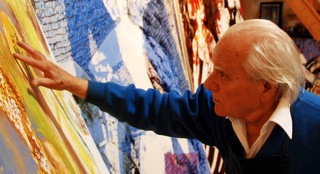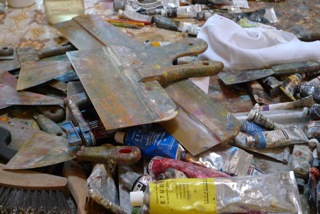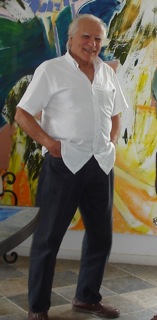Henry Ferrier, the Artist
Henry Ferrier is firmly rooted in Provence; he loves the natural beauty, the light and the strong culture. His life has involved many different passages but his passion for art has been a continuous thread, despite challenges along the way. Henry has been a teacher, a husband, a father, a successful artist and now a writer. Henry, young at 83 years, is busy preparing for a book launch and new painting exhibition; he took some time to speak to My French Life™.
Admittedly, I was not sure how to prepare for an interview with Henry. I had read the preface and preliminary pages of his soon to be published book Itineraire d’un Peintre Amoureux. I also had the immense pleasure of spending some time socially with Henry and his lovely wife Annick. Dutifully, I had readied my list of questions in advance. However, I was fully prepared for a long and engaging discussion that was unlikely to follow a prescribed path.
Our interview was conducted in French, while I tried to capture the essence of our conversation with English scribbles. The following is the result of a wonderful afternoon with a man of extraordinary passion and deep philosophical views.
When did art enter your life?
From his earliest memories art and specifically painting have always been a part of Henry’s life. At a young age, he started painting the walls in the family’s rental apartment in Marseille. This was not an activity that was welcomed by his hardworking parents. By age of nine, he began attending evening art classes at L’École des Beaux Arts de Marseille . His portfolio case was almost as tall as he was, but he proudly carried it back and forth from school. He says, “the portfolio made me feel like I was not alone.”
Not wealthy by any means, Henry’s family was not one focused on art or any luxuries; they were just trying to survive. Other than the walls of the apartment, Henry would collect wrapping paper from the fishmonger and the butcher to use as a medium for his creativity. He distinctly remembers how the effects of the black crayon on the grey or yellow paper, pleased him.
Describe your childhood?
Henry was born in Marseille in 1928. His family lived in a tiny rental apartment on Rue Goudard. The choice of their location was based on affordability and proximity to the Gare Saint Charles, where his father worked as a porter.
His parents were not from the city, they were mountain people from the area of Cévennes in the Gard. Both of his parents were orphans. His father served for France in World War I, in France during the ‘Retraite de la Marne’, as well as in Russia and the Middle East (‘Dardanelles’). His father had lived as a soldier for so many years that it was all he knew. Following years of service, his father was decorated by the State for his contribution to the country and he was soon able to find employment in Marseille with the SNCF. Once working, he married and soon after he and his new wife had two sons; Henry was the younger of the two.
Henry reflected on his memories of his father as a strong and wilful man. His memories of his mother are reproduced in some of his paintings, watching her cook from the loft space above the kitchen in their tiny home. His older brother was neither scholastically inclined nor ambitious. Henry chooses his words carefully when talking about his relationship with his brother, as they certainly were not of the same commitment when it came to education. At the time, usually the firstborn son would be entitled to an education, with the other siblings contributing to that advancement. In Henry’s case, his brother rejected formal schooling, and Henry took his place.
Life was not easy. The area of Marseille where the Ferriers lived did not have electricity at that time. Henry remembers studying for school by oil lamp. He showed me a painting that he had done of this early memory.
How did you follow your passion at a time of poverty, war and other challenges?
Henry describes his life as a series of passages; Marseille, Paris, Provence.
His early years in Marseille were about school and the beginning of his life long passion for art. Henry achieved exceptional academic results and showed considerable promise in school. However, his parents who had little educational background felt that he should start working to contribute to the family finances. Henry’s teachers begged his parents to let him stay in school. Committed and dedicated Henry passed his baccalauréat, the first child in that area of Marseille to have ever done so.
His father having lived through much fighting and the destruction of war, was concerned his second son would be imperilled and refused to sign the papers allowing Henry to join the liberation forces in 1944. The result, Henry left home at 17 to start work. His first job was working in the many Centres Sanitaires et Scolaires de Provence, which existed in the region. These centres were established to care for the multitude of orphans created as a result of World War II. Henry worked as a supervisor and mentor for the children. The work was voluntary; however, it provided room and board. To Henry’s dismay his father did not consider this to be real work.
Henry was not discouraged for long, and quickly found himself a job with l’Education Nationale. He worked in various detention centres focusing upon disabled children. To this day, he describes himself as more at ease with children than some adults who are too arrogant or too serious.
Did any particular artists or events affect your artwork?
Certainly the war was a powerful influence. Although, Henry did not participate directly in the war, the impact was all around him. He says there are still striking and haunting images that remain today.
Although, there was no specific artist or style that influenced Henry’s work, he feels he has been able to learn from many. Religious pieces that he has seen in Venetian chapels are striking in that the paint almost talks. He does describe some of the work done by Bronzino (Florence), as an amazing demonstration of strong expressions and a remarkable ability to play with colour. Picasso was an inspiration in his demonstrated intelligence and bold experimentation with different mediums and techniques.
En fait, ma peinture se nourrit de mon vécu, de mes émotions face au monde qui nous entoure, un livre de bord en quelque sorte.
(In fact, my painting is nourished by my life experiences, my feelings about the world around us, a journal of sorts.)
How would you describe your art?
Henry describes his art much like the forces of nature that make Provence attractive; powerful lighting, insistent wind and movement, the summer heat, the rhythm of rain, and the beauty the olive trees and the limestone. It is a gift.
Dans sa peinture il y a la Nature, il ya les Hommes, il y a le Monde. Quand je commence une toile, je ne sait pas ce qui va sortir, j’oublie la technique et je me laisse venir le geste comme un cadeau.
(In his painting there is Nature, there are Men, there is the World. When I start a piece, I don’t know where it is going to end up, I forget the technique and I let myself make a movement like a gift.)
An ambitious new book due out this fall, what was the impetus?
Henry has long been a writer. Over many years, he has continued his search for answers regarding the large questions in life and has used writing a means to explain his thoughts. Three notable ladies have influenced him to merge his love of writing with his artwork. These women include; Annick his energetic wife, Béatrice Hermesdorf who has written the book’s preface and Catherine Strumeyer the editor. The fruit of the group’s labour are evident in the book, it is a balance of bold paintings, strong emotions and a description of a life well lived.
What is one word you would use to describe Henry Ferrier?
Henry is not one who is stumped for words; we had talked for close to two hours when I asked this question. It took a few moments of reflection, and he decided the word should be optimistic. His viewpoint is that change happens and, it is both amusing and sometimes unpleasant, it just depends on your lens. He feels at ease with his soul. He loves the relationship that he has to the natural environment. Most of all he feels it is extraordinary to have lived. These are a few of his own words from his book:
On ne décide pas de venir au monde,
On y vient,
On ne décide pas de devenir peintre,
On le devient,
On ne décide pas de quitter le monde,
On le quitte,
Un jour je t’ai rencontré,
On ne décide pas d’aimer.
We do not chose to come to the World,
We come to it,
We do not decide to become a painter,
We become it,
We do not decide to leave the World,
We leave it,
One day I met you,
We don’t decide to love.
If you would like to see and read more about Henry and his work, his web site is here.










Henry Ferrier seems a fascinating man and wonderful artist. Thank you Carolyne for this insight into the artist’s life and perspective.
Thanks Judy, it was a fascinating afternoon.